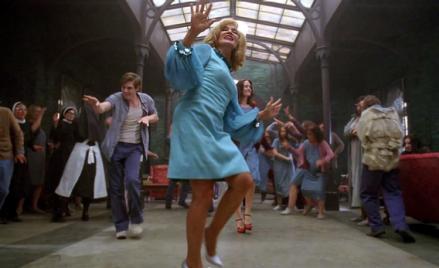What do you remember from last week’s episode of American Horror Story? The “Name Game” dance sequence, probably, and maybe a handful of other dramatic moments. But can you recall how those individual bits related to one another? Could you easily diagram the plot advances and relationship developments that happened last Wednesday? I know I couldn’t, and I get paid to keep up. And forget about trying to seriously reflect on the details of earlier episodes (not to mention the entirety of the show)—it all just disintegrates into a jumbled, madcap mess, like rosary beads loosed from a string.
So what does it mean that AHS toys with our memories, that it resists the kind of linear, plot-driven consumption that makes shows like Homeland or Mad Men so irresistible? One possibility, of course, is that it’s just badly written; all those loose ends and frayed edges and dropped stitches are merely the result of a hypercreative mind that might benefit from Adderall. But then that’s not quite right: Poor craftsmanship should lead to frustration and, ultimately, aversion; and yet, I can think of very few shows that have held my attention as firmly or excited me as much as AHS had done over these past two seasons. So if it’s not narrative that’s holding me hostage in Briarcliff—not a meaningful investment in the characters and their journeys made possible by the intimacy that memory affords—what is it?
At the beginning of the Asylum season of AHS, I advocated “vibe-watching,” which I defined as engaging with a program in terms of its general aesthetic rather than its storyline. I still stand by that recommendation, but as this season has progressed I’ve become increasingly preoccupied with just what, exactly, the nature of that aesthetic is. Clearly, there’s an element of camp involved (we are talking about a Ryan Murphy creation after all); however, that’s only part of the mix. Last week’s episode, in which we jumped from nun-on-priest rape to hallucinated dance sequence to self-cremation of a former Nazi, clarified the other main ingredient: parataxis.
Briefly, parataxis is the artistic or literary technique of placing unrelated materials beside one another to encourage the exploration of the unpredictable resonances that arise between them. It’s most popular in poetry—see John Ashbery’s The Tennis Court Oath, for example—but as television shows go, American Horror Story’s use of the technique seems particularly novel. Think of all the complaints that have been leveled at AHS: that it’s unwieldy, unfocused, fragmented, thinly written, hard to follow, overly frenetic; that its exotic macroseasonal “anthology” structure is confusing. Well, sure! If AHS is a work of paratactic art, those are welcome features, not bugs.
One fun thing about parataxis is that it invites the viewer to, in effect, “choose his own adventure,” to curate his own private program out of the elements and resonances of the aesthetic landscape that appeal to him (this is the primary pleasure of vibe-watching). But the flipside of that invitation is that parataxis has the tendency to inspire a kind of critical numbness in the face of the mass of seemingly unorganized material and lack of explicit authorial/narrative direction. You can readily see this numbness when you read recaps of AHS, all of which (including my own) usually amount to a sort of stoned “Whoa, man! Wasn’t that crazy?” When we’re bombarded rapid-fire with alien violations, boil-ridden amputees, failed self-induced abortions, half-crucifixions, sadistic electroshock sessions, and all the rest—and when those events and others seem to have little to do with one another—in the face of all that terror, we’re weirdly left numb.
Earlier, I questioned what binds us to this show, and the answer lies in this trick: We’re left numb, but not comfortably so. As the season has progressed, even as I continue to gasp with glee at this or that transgression and revel in the general cacophony of the thing, I’ve noticed a growing sense of disquiet in my gut, an aftertaste of anxiety at the close of each episode. In a word, I feel guilty. With each new act of cruelty, each push forward into the depths of human abjection, I feel a little more implicated, a little more tainted, and so, like any good viewer of horror, I hang around to be redeemed at the end.
But that’s where Murphy’s got us screwed. In almost all cases, horror, as a genre, provides its audience with an alibi to avoid the inherent guilt (assuming you’re not a certified sadist) of taking pleasure in violence. We are meant to identify with a striving victim, with the archetypal “final girl” who makes it out of the psychopath’s lair. We are absolved from enjoying her pain, because we are, of course, rooting for her ultimate escape. Unfortunately (and brilliantly), American Horror Story doesn’t give us that out. In Briarcliff, just as in Murder House before it, there are no morally uncomplicated heroes, no innocent characters to act as our confessors. Though individuals may from time to time act altruistically, everyone is dirty, and there is no redemption waiting at sunrise for them (in fact, if Murder House’s conclusion is any indication, they’re all likely to end up dead or otherwise beset)—or at the end of the season for us.
We Americans are superbly skilled at forgetting; indeed, the grand American self-conception is contingent upon the repression of all the violence that it took to establish the nation and that is still required to keep it propped up. Murphy knows that the land is soaked with blood, and American Horror Story is precision-tuned to exploit and critique that pathology. That is why Jessica Lange’s dance number last week was truly genius: What happens when you stop numbly twirling and hallucinating your way through life (or a TV show) and actually try to name the situation? Like Sister Jude, you may find you’re in a far darker place than you imagined.
